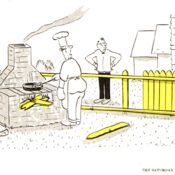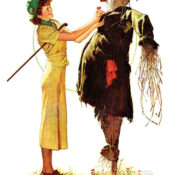Near our farmhouse in southern Indiana sits a home built in the early 1900s. Until recently, an elderly woman lived there before passing away. A for-sale sign went up in the yard; it was quickly purchased and then just as quickly torn down and replaced with a new house with none of the character of the old one. I have a bad habit of telling people what I think whether or not they want to hear it, so when I saw the new owner in the hardware store, I mentioned my disappointment in seeing the old house torn down.
“It’s a lot easier finding someone who’ll build you a new house than finding someone willing to fix up an old one,” he told me.
In one sentence, he summarized the biggest problem in America today. Well, maybe not the biggest, but certainly in the top five. No one knows how to fix things that are broken, whether it’s a house, a car, or Congress. So you can imagine my delight when my wife and I purchased her family farmhouse 13 years ago and, against all counsel, decided to restore it rather than tear it down. That brought us into the orbit of Ross Hutcheson, perhaps the last man in America who can fix anything.
Ross and I met at the farmhouse in October of 2011, a carpenter with leather skin and a pastor with soft hands, standing in the front yard inspecting the sagging lines of the house, cobbled together by my wife’s grandfather, a farmer, in 1913. Ross circled the house, then went inside, poking, examining, frowning.
“Can it be fixed?” I asked.
“Anything can be fixed,” he said.
That was the can-do attitude I was hoping to find, so I asked him when he could start.
“Next week,” he said, shaking my hand, sandpaper meeting silk.
I agreed to meet Ross every Friday at the farmhouse to pay him for that week’s labor and materials. It soon became my favorite day of the week, rising before sunrise and driving a hundred miles south to witness that week’s progress and pass out the money I had saved for my retirement, but then retirement is overrated. Ask anyone who’s retired whether they’d prefer a rebuilt farmhouse on 80 acres or more money, and if they have half a brain, they’ll pick the farmhouse every time.
As my friends became aware of the project, they offered advice: get everything in writing, demand receipts, buy extra liability insurance, and make sure a lawyer looks over the contract, which wasn’t possible since I didn’t have a contract or anything else in writing, or anything signed. Or a lawyer, for that matter. Each Friday morning, Ross told me what I owed him, it always seemed perfectly reasonable, and I wrote him a check. Six months later, the crooked had been set straight, the weak made strong, the worn-out renewed.
Ross and I hail from the same generation, when young people were told that if they didn’t go to college their lives would end in disaster. Thank God Ross paid no attention to those gloomy predictions and decided instead to be useful. I, on the other hand, attended college for ten years but still can’t look at a roof and calculate its pitch and rafter lengths in my head. Nor can I do it on paper, or with a calculator for that matter, but Ross can in five seconds and be spot on every time. It just goes to show you the enduring usefulness of a master’s degree in theology.
Philip Gulley is a Quaker pastor and author of 22 books, including the Harmony and Hope series, featuring Sam Gardner.
This article is featured in the September/October 2024 issue of The Saturday Evening Post. Subscribe to the magazine for more art, inspiring stories, fiction, humor, and features from our archives.
Become a Saturday Evening Post member and enjoy unlimited access. Subscribe now




Comments
Reminds me of the house I grew up in, which had been built by my great grandfather in the early 1900’s. My sister and I used to laugh at the crooked door frames but it was a great house to grow up in and I do kind of miss it.
We live in an ugly time. City buildings are cold, sterile and fretful to conduct business in. Homes are all cookie-cutter! Restoration of actual craftsmanship is much needed!
Wonderful article! Makes me homesick for the old house on the farm. They aren’t just houses, they are a true home, always comfortable and to a child a protector. I live in a “house” in So. Calif. and that is all it is, just a building
I must shout a resounding Hallelu Yah! One more old soul saved at the hands of a seasoned restorer. Thanks Ross. Old houses and barns from the late 1800’s thru early 1910’s are a treasure to behold and remain a lifetime investment in the hands of a sensible person such as you, Philip Gulley. Cheers to your saving grace…